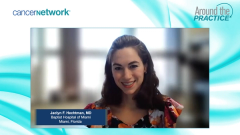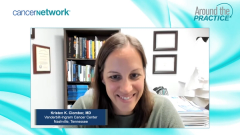
Overview of HER2-Positive Metastatic CRC
A panel of expert oncologists consider how HER2 expression can positively impact the selection of targeted therapies for patients with metastatic colorectal cancer.
Episodes in this series

Transcript:
Cathy Eng, MD: Thank you so much. Now Kristen, I'm going to just ask you, Tony brought up an excellent point and I'm so glad he mentioned it because it's not discussed especially during the presentation of PARADIGM at ASCO [American Society of Clinical Oncology]. But can you talk more now, we've got left-sided tumors. We're thinking that EGFR therapy. Can you just comment for the audience that may not be as familiar with this. What is the percentage of patients that are going to be HER2-positive? Also, how does that relate to left-sided tumors as well as EGFR therapy? And then I'll have Jaclyn after that discuss about HER2 testing once again just to make sure everyone's clear about that. If you could comment, please?
Kristen K. Ciombor, MD: HER2 amplification is becoming a very important marker in colorectal cancer. It is relatively uncommon. Approximately, 5% though it is more enriched in the left-sided population, so it's important to look for this marker because not only is it a predictive marker for response to anti-HER2 therapy, as we'll talk about, but it's also potentially a negative predictive marker for response to anti-EGFR therapy. Specifically, Dr Saab presented at ESMO [European Society of Medical Oncology] this year. Dr Saab and colleagues presented a nice study looking at this association because we've always wondered, we've seen anecdotally and in our own experience that patients who get anti-EGFR therapy who are HER2-positive. We always thought that maybe they didn't do quite as well, Dr Saab looked at this and in fact did a systematic review over the last 20 years looking at patients who were RAS wild-type specifically, and that's important, an important variable as well. And these were patients who all received anti-EGFR therapy, either by itself or in combination with chemotherapy, who are also HER2-positive. This is a pretty big cohort given the relative rarity of the biomarkers, over 600 patients. Most of them did have left-sided tumors, which is what we would expect because that's typically what we see, and in this systemic review and actually, a meta-analysis as well, the odds of response to anti-EGFR therapy was almost 50% lower in the patients who were HER2-positive than those who were HER2-negative. That's really important data that we need to get out into the community and among our colleagues as well, that this is not the way to go in terms of an effective therapy in the patients who are HER2-positive. Not only for selecting patients for anti-HER2 therapy, but also making sure we don't give ineffective therapy for patients with this biomarker.
Cathy Eng, MD: And then keeping in mind there's obviously toxicities with EGFR therapy. If it's not going to benefit, it'd be better off knowing early on for these patients and the cost.
Kristen K. Ciombor, MD: Absolutely. The cost, the time, the toxicity. All of that is key, and we're whittling away the pie in terms of who benefits from anti-EGFR. It's an incredibly effective regimen or drug in combination or as monotherapy, but we're learning more and more every day about who benefits and in what combination. For instance, BRAF is similar. You don't give that monotherapy, but in combination with a BRAF inhibitor, it's important. Understanding the pathways behind this sensitivity to anti-EGFR and mechanisms of resistance are key.
Cathy Eng, MD: Thank you. Dr Hechtman, can you please comment. What is the most appropriate way for a medical oncologist to test their patients for HER2 amplification? We know it's uncommon, as Kristen mentioned. We know it's predominantly left-sided tumors, but how do we make sure that our providers are testing appropriately?
Jaclyn F. Hechtman, MD: I'd say the most looked at and studied and well-established way to look at HER2 is by IHC. I guess the initial criteria for colon when the first studies came out on HER2 were the HERACLES criteria, and they differed significantly from either criteria, where 50% of tumor cells in tumor in the colon were required to be positive to overexpression, and that's very different from gastric, whereas, for example, you need 10% in resection or just a cluster and a biopsy because there's no heterogenic tumor. Other trials used the gastric criteria, they stopped using the HERACLES criteria and used the gastric criteria, which required only 10%. The most standard way to do it is IHC. There are a couple of criteria out there, gastric criteria, HERACLES, and the lab should tell you what sort of scoring criteria they use when they do that, and when it's applicable. So moderate intensity of staining in reflex to FISH, so the number of HER2 signals in red are calculated against the number of centromere enumeration probe 17 signal in their ratio, and really what you're looking at in FISH is that ratio. You want a ratio of at least 2 to 1, or at least 6 copies of HER2, even if you have high polysemy. The kind of newer method when we're talking about all these alterations that can also be found, you can also look at HER2 copy number status by next-generation sequencing. The difference between that and FISH is instead of looking against the centromere enumeration probe, the number of reads from the HER2 gene are calculated against other reads from different genes in the panel that you're looking at, so it's normalized to that, and there's a lot of software programs out there, and it usually gives you a total change. There might be twice as many HER2 copies as opposed to other types of reads or probes present. Those are kind of the 2 method ways, IHC with reflex to FISH and a couple of scoring criteria for the IHC or NGS, and it depends what your in-house laboratory offers, or the reference lab if you're at a smaller place how they do it.
Cathy Eng, MD: Thank you so much.
Transcript edited for clarity.
Newsletter
Stay up to date on recent advances in the multidisciplinary approach to cancer.










































